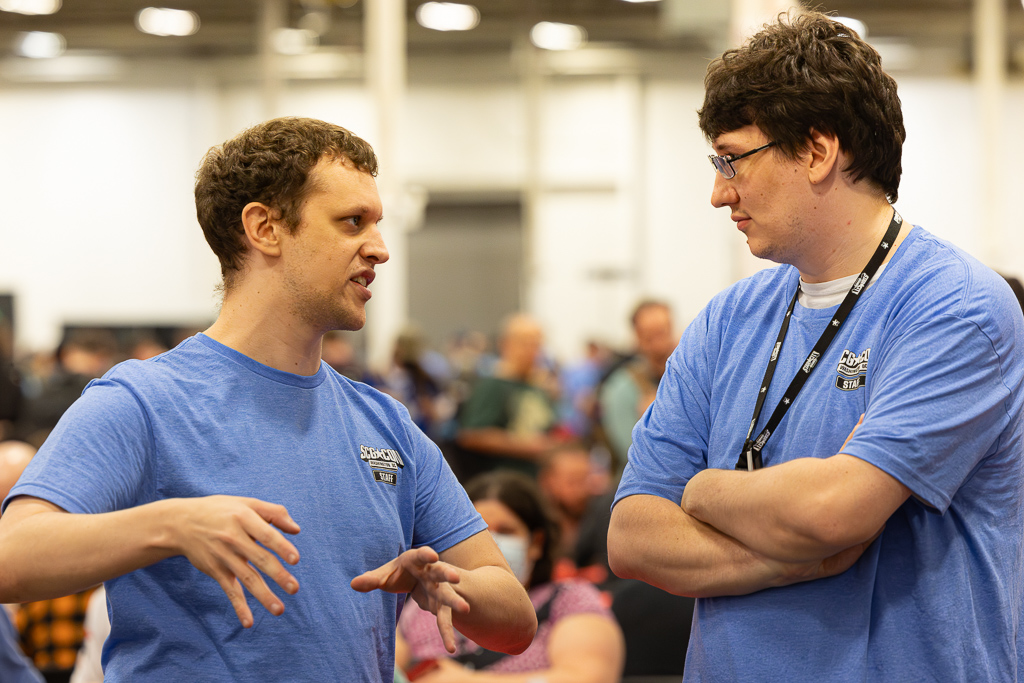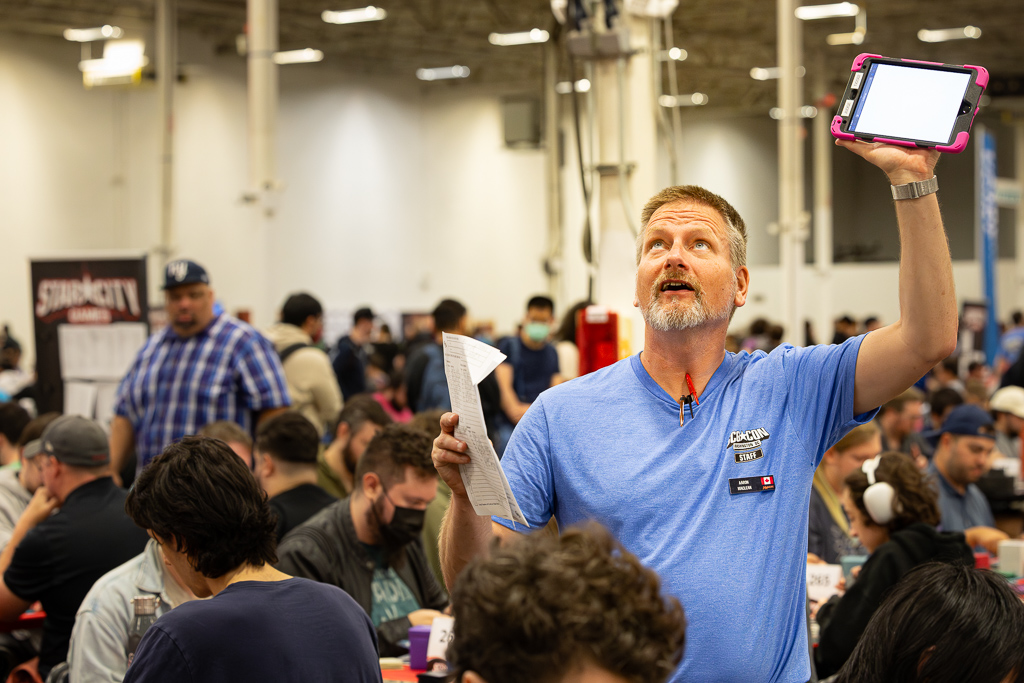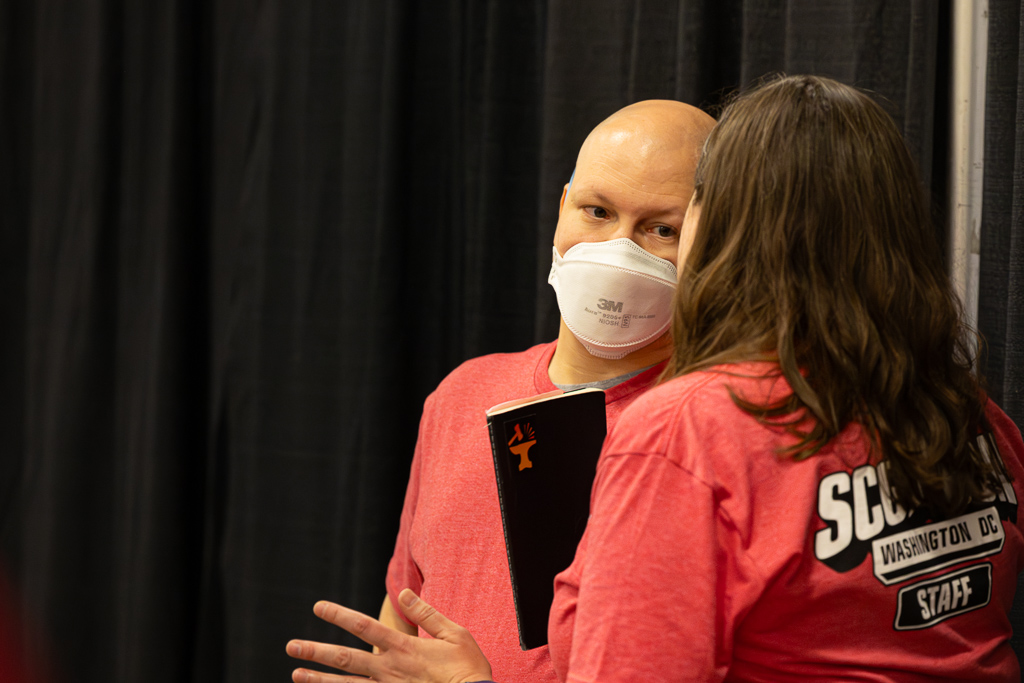Earlier this month, a number of judges provided feedback about the difficulties of arranging to take their advancement exams. We appreciate all this feedback – as a reminder, the Feedback forum is the best way to provide feedback to Judge Foundry’s leadership, especially if it’s a thought that you want workshopped with other judges.
When we developed Judge Foundry’s testing protocols, we wanted them to stem from our key value of mentorship. You can’t learn how to be a good judge just by reading a book or watching a video – you need to be out in stores, judging events, getting feedback from players, tournament organizers and, most critically, other judges. That’s true at every level – from FNM to the Pro Tour, judges improve our skills by taking calls and examining what we did well and what we could do better. As a result, we wanted the first step on the journey to becoming a judge to be working with a mentor, and having a relationship that will continue even after a candidate passes the Level One exam. Many judges still rely on their mentors years or even decades later, and become mentors themselves to continue to pass on knowledge.

With that said, we recognize that some areas of the United States and Canada have become judge wastelands, bereft of judges who can start the cascade of mentorship. This is especially the case in the corners of our service area – while a judge in Nashville can find a mentor by driving an hour up or down several interstates, a judge in Hawaii, Nova Scotia, or Miami is going to be constrained by geography, at least until we certify some merfolk. Additionally, there are areas where there are strong communities of Level One Judges, but no nearby Level Three Judges to start some promotions to Level Two.
With all that in mind, here are some thoughts about how to level up, even if you’re in a remote area. This article will focus primarily on testing for Levels One, Two and Three – by the time you’re working toward Levels Four and Five, you’re generally already working with a significant portion of the community.
Mentorship First
Every judge needs mentors. Years ago, there was a requirement for all Level Two Judges to write a tournament report every year in order to maintain their levels. This led to a lot of tournament reports, and while quality varied, it was fascinating to see what judges did that they thought was perfectly normal, only to discover it wasn’t. When someone says “I’m self-taught, and I do a great job,” that might just mean “I don’t know what I’m doing wrong because I don’t have anyone to tell me.”
While many judges got started by meeting judges at events at their local game stores and learning from them, that isn’t the only path to finding a mentor. Ideally, your mentor will be someone at least somewhat local to you, because there’s no substitute for watching you judge. That said, this isn’t always going to be possible, and there are other ways to get this experience.
Remember that your mentor doesn’t have to be a judge of a high enough level to administer an advancement exam. Many Level One Judges act as mentors to judge candidates, and then pass along the candidate to an L2, saying, “I’ve watched my friend run a couple Prereleases and quizzed him on the JAR, and I think he’s ready to certify.”
A great way to find judges in your area is by using the map on JudgeApps. It’s not infrequent that a player will lament “I want to become a judge, but there’s no one in my area to mentor me!”, only to learn that there’s a certified judge just a few miles away. You can also contact your Regional Advocate, who might know of judges in your area or be able to get the word out to see if a judge from outside the area is coming down to run an RCQ or other tournament where you might be able to meet. JudgeApps provides the ability to send an email to any judge, so it’s a great tool to contact a judge to ask for help.
Another great way to find a judge is to ask around at your local game store, especially around the time that store is running a major competitive event. You can ask the tournament organizer if they know any judges, or stop by during an RCQ to ask some of the local competitive players who the judges in the area are. Chances are that one of them will be able to point you in the right direction.
Lastly, a great way to become a judge is to join or form a judge study group. You can post invitations on JudgeApps, like this group did, or post about it on the bulletin board on your store or on social media. Studying together will help everyone improve your skills, and when it’s time for you to all seek certification, it can be easier to get a higher-level judge to come in to do interviews and testing. If you already have a group and are having trouble finding someone to administer testing, contact your Regional Advocate or fill out the Conference Request Form and we’ll try to help you out.

Testing at an Event
One place you’re sure to find judges is working tournaments. It’s often possible to arrange to test at large regional tournaments. You should expect to interview and test off-shift – you’re being paid by the tournament organizer to work. At previous MagicCons, the Community Team on Saturday and Sunday administered interviews and exams, so judges not on shift were able to discuss advancement with experts.
If you’re looking to test at an event, be ready to answer the question “Why are you interviewing/testing with me and not back home?” If the answer is “There’s no one back home who can administer it,” you’ll probably be good to proceed. If the answer is “I keep doing terrible things at tournaments that have led to my being banned by all the local stores, so please make me a judge and I’ll show them. I’ll show them all! Mwa ha ha ha ha!”, you should expect to receive a polite decline.
Most importantly, you should expect to be asked with whom you’ll continue to have a mentoring relationship. Some judges doing testing at events might be willing to do that, and some might not. You don’t necessarily need to name someone higher-level – there’s no reason a Level One Judge can’t mentor another Level One Judge, or even a Level Two Judge. But you should have someone to whom you can go after an event to get a second opinion on your choices.
Note that testing at an event, especially if you’re working that event, can be high-stress. After a day of taking calls, your brain is going to be tired and you might miss things that you’d otherwise catch. Consider carefully if you want to risk failing the exam by taking it after work. On the other hand, there’s something exhilarating about passing the exam and leveling up when you can go out to dinner to celebrate with many of your friends (or go out to the bar to commiserate with just a few friends).
Testing at a Conference
Conferences provide an outstanding opportunity to meet a new mentor, build your skills, and test for advancement. Like events, conferences give a group of peers with whom judges can celebrate after leveling up. One big difference from event testing is that conferences provide judges a chance to interview and test at a leisurely pace.
If you’re in an area where several judges want to level up, but are held back by the lack of someone able to perform interviews and administer tests, consider hosting a conference and inviting a higher-level judge to it. That judge can give a master class on some judge skill that will be useful for judges of all levels, and then while other seminars or activities are happening, the high-level guest can work with candidates for advancement.
Judge Foundry has set aside a budget for these conferences, including to sponsor travel for the guest speaker and tester – if you’d like to host a conference like this, fill out the conference request form. When you do so, make sure you include notes about how many judges would be interviewing and testing for what levels, if you’ve already contacted a high-level judge to arrange for them to join you, and what you expect their travel costs to be. It can also be helpful to contact your Regional Advocate to ensure that no one else is planning a conference to do the same thing around the same time.

Testing Remotely
All the methods above are our preferred remedy for judges who don’t have high-level resources in their area to jump-start a judge group. However, we recognize that some areas are truly exceptional – we don’t expect anyone to travel to Alaska to administer an exam. In general, to be approved for remote testing, you need to live at least 150 miles from the nearest judge who could administer a test, and not have a major event coming to your area within the next three months. We set these expectations not as hard-and-fast laws (if you’re 149 miles from the nearest judge, we don’t expect you to wait on plate tectonics), but as a guide of our expectations. We’re okay with using remote testing if testing in a traditional manner is oppressive, not if it’s merely inconvenient.
We also expect that if you’re testing remotely, you still have a place to judge. Judges judge events, and if you’re looking to become a judge in a place that has no judges because it has no organized or in-store play, you’ll want to work on resolving that issue first. “Judge” is an activity first, not a title.
Lastly, note that the content and rules of testing are the same whether the test is administered traditionally or remotely – all our advancement exams are still closed-book and you should expect to have to demonstrate that you’re not accessing outside assistance while taking a test remotely.
If you’ve reached this far and still want to investigate remote testing, contact your Regional Advocate via JudgeApps. They’ll investigate to ensure that you qualify, see if there’s a better option that you might not realize, and if they agree that remote testing is right for you, they’ll go for approval to the Levels Manager and Testing Manager for a final decision. In the event of a tie, these two managers will consult the Exam Manager for the appropriate exam you’re looking to take.
Conclusion
We hope this clarifies our policies on remote testing. As you can see, there are a number of excellent options for judges who aren’t yet connected to a community in their areas, including options funded by Judge Foundry with the intent on improving judge skills. And, if it’s truly needed, we’ll authorize extraordinary accommodations for judges who live in areas where judging just needs a little jump-start.
We expect this to be pretty rare, and to get more rare in future years as Judge Foundry membership continues to grow and more areas grow or regrow their judge communities. In the meantime, if you’re ready to get started, this hopefully gives you some guidance on your next steps. And if you have feedback, please let us know via the Feedback Forum or by talking to one of us at an event.
